The Lyngør islands, Norway. Photograph: Matti Bernitz
Explore Europe’s lesser-known islands and enjoy a leisurely break where walking, watersports and doing nothing at all are the order of the day
Lyngør Islands, Norway
A far cry from Norway’s jagged western fjord-filled coastline, the Lyngør Islands offer Baltic calm rather than wild Atlantic. Base yourself on the islands of Sandøya or Borøya (where you can park your car) and use the ferries to get around. If ferries are too mainstream, Norwegians rave about kayaking between these tiny islands, so expect to see lots of brightly coloured boats being hefted around by visitors. Kayak rental is available in Tvedestrand, the town at the head of the fjord. Lyngør Island can only be reached by boat: there are no cars, and the main village consists of weathered clapboard wooden houses.
Stay The Tvedestrand 58 holiday house on the island of Boroya, which sleeps up to six, costs from £455 for seven nights.
Getting there Norwegian airlines flies to Oslo from £40 return; it’s then a two-hour drive south.
Stay The Tvedestrand 58 holiday house on the island of Boroya, which sleeps up to six, costs from £455 for seven nights.
Getting there Norwegian airlines flies to Oslo from £40 return; it’s then a two-hour drive south.
Mljet, Croatia
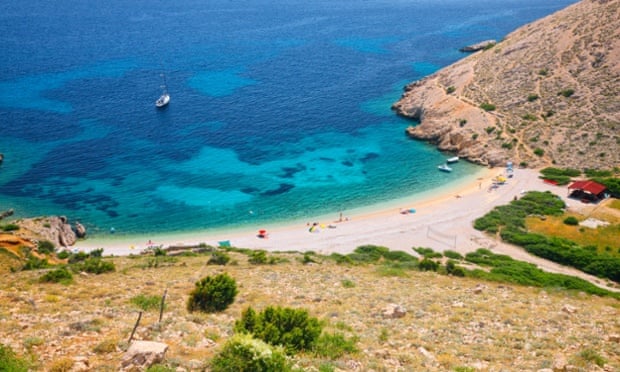
Odysseus was allegedly held captive here, for seven years, by the nymph Calypso, but it can’t really have been all that bad. One of Croatia’s southernmost islands, it’s best known for exceptional local produce and wild beauty. There are great hiking opportunities around the two saltwater lakes in Mljet national park and it is possible to hire a sailing boat to reach the 12th-century Benedictine monastery on Melita Island. Scramble around the island’s shady trails and swim in some of the clearest water in the Adriatic at Blace Bay. Choose a bottle of local red for your sundowner – Dingac and Postup are produced on the island – and try the plates of raw mussels drizzled with lemon juice, a local speciality.
Stay There’s only one hotel and it’s right on the coast – the three-star Odisej Mljet, with doubles from £33 B&B.
Getting there It’s a 90-minute ferry from Dubrovnik to the bay of Sobra on Mljet on Jadrolinjia lines.
Stay There’s only one hotel and it’s right on the coast – the three-star Odisej Mljet, with doubles from £33 B&B.
Getting there It’s a 90-minute ferry from Dubrovnik to the bay of Sobra on Mljet on Jadrolinjia lines.
Aegina, Greece
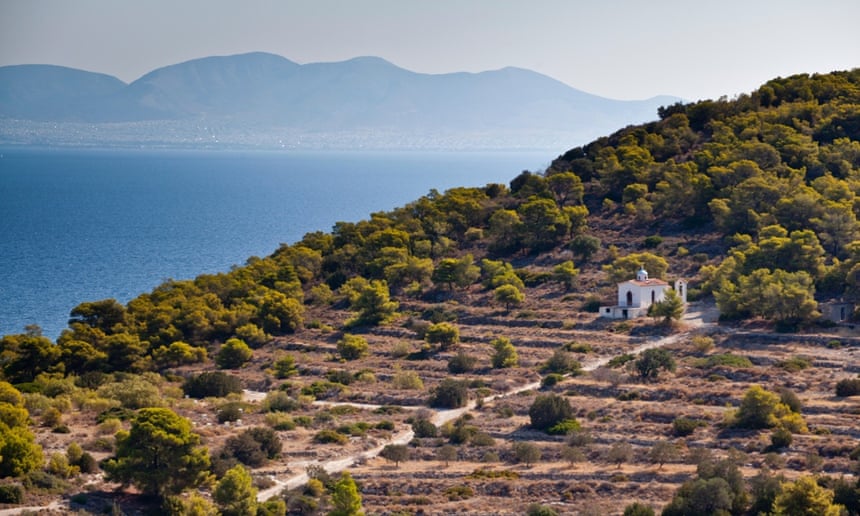
Come for the seafood, stay for the peace. Aegina, only one hour by ferry from Athens, is a great base during a summer weekend break. The heat in the city can be harsh; escape the crowds to spend evenings snorkelling the coast and devouring cuttlefish in wine sauce at Nontas – a beachside taverna close enough to the water to see your dinner being caught by local fishermen. As for hiking, the island’s trails lead you past ruined churches, meadows of wildflowers, and craggy hillsides.
Stay Clean, bright, and sun-drenched rooms at the Marini Luxury Apartmentscome with balconies and panoramic views over the sea, doubles from £66.
Getting there Metro from Athens centre to Piraeus port, an hour’s hydrofoil journey (£7) to Aegina.
Stay Clean, bright, and sun-drenched rooms at the Marini Luxury Apartmentscome with balconies and panoramic views over the sea, doubles from £66.
Getting there Metro from Athens centre to Piraeus port, an hour’s hydrofoil journey (£7) to Aegina.
Fehmarn, Germany
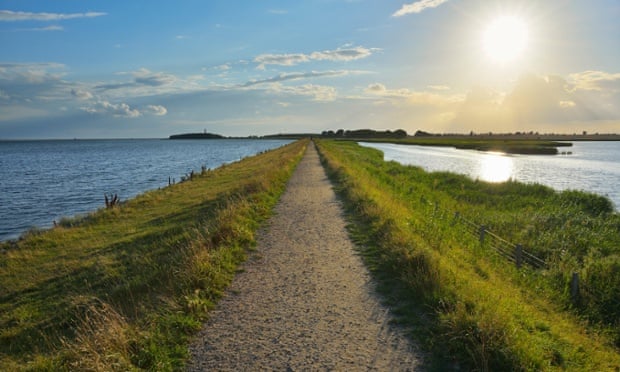
Fehmarn, an island just off Germany’s Baltic coastline, catches the rays in spades while adventure junkies can kitesurf the days away (it plays host to various kite surfing competitions every year). Those after a more gentle ramble should pack their boots for Fehmarn’s portion of the Via Scandinavia: a walking route from Lübeck that runs through Germany and Poland, and on to Norway. Fehmarn’s scenery makes it unique among Germany’s Baltic islands. Badwelt Fehmare is a spa complex on the island and many visitors make the journey to enjoy seaweed wraps (taken from the shore) and natural saltwater scrubs.
Stay Close to the old town and a sandy beach, Apartments mit Flair has accommodation from £42 a night.
Getting there From Hamburg it’s a 90-minute drive to Burg, the historical capital of Fehmarn.
Stay Close to the old town and a sandy beach, Apartments mit Flair has accommodation from £42 a night.
Getting there From Hamburg it’s a 90-minute drive to Burg, the historical capital of Fehmarn.
Inis Oírr, Aran Islands, Ireland
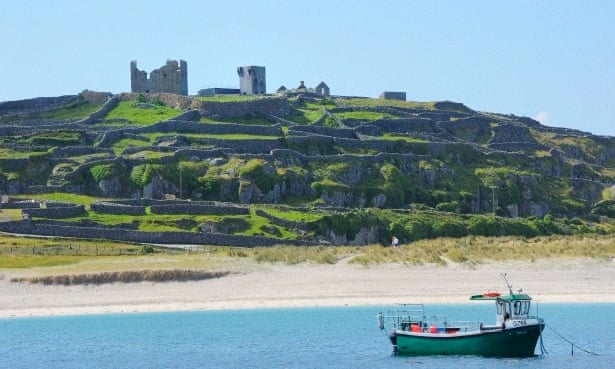
This is an island of ancient language and mythology where the white beaches stretch out into the Atlantic. The smallest island in the Aran archipelago, Inis Oírr (pronounced Inisheer) only got permanent electricity in 1997. The Inis Oírr trail threads through fields carpeted with wildflowers; gentian, cranesbill and ladies mantle dust your ankles as you pace around the island under the shadow of O’Brien’s ruined 14th-century castle. Recuperate at Ostan Inis Oírr with a pint of Guinness and live music, which gets visitors up for a dance.
Stay South Aran House, with doubles from £60 B&B, is a guesthouse with free Wi-Fi, four en suite rooms and underfloor heating. The attached cooking school suggests that guests are in for a treat at breakfast.
Getting there Ferry from Ros a’Mhil costs £19, adult return, with Aran Island Ferries.
Stay South Aran House, with doubles from £60 B&B, is a guesthouse with free Wi-Fi, four en suite rooms and underfloor heating. The attached cooking school suggests that guests are in for a treat at breakfast.
Getting there Ferry from Ros a’Mhil costs £19, adult return, with Aran Island Ferries.
Belle-Île en Mer, Brittany, France
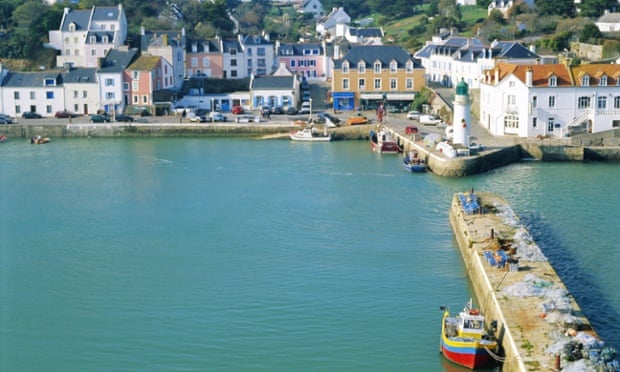
An island that lives up to its name, its dramatic coastline and green interior inspired 19th-century authors and artists, most famously Flaubert and Monet. Now it draws holidaymakers in their droves in August, but outside of this short peak season its 60 beaches are gloriously crowd-free; and even in August your fellow tourists are unlikely to be Brits, who prefer chichi Île de Ré further south over its wilder Atlantic cousin. While Belle-Île has a handful of low-key attractions, including Sarah Bernhardt’s house, now a museum, and the lighthouse at Bangor, the main draw is the natural environment. In August beach lovers and walkers are joined on the island by opera buffs who come for the popular classical music festival Lyrique en Mer. Read more on the island in our Brittany article.
Stay Hotel Le Clos Fleuri has doubles from £53.
Getting there Ferries leave from Qubieron, 14km away.
Stay Hotel Le Clos Fleuri has doubles from £53.
Getting there Ferries leave from Qubieron, 14km away.
Cíes islands, Galicia, SpaiFrancen
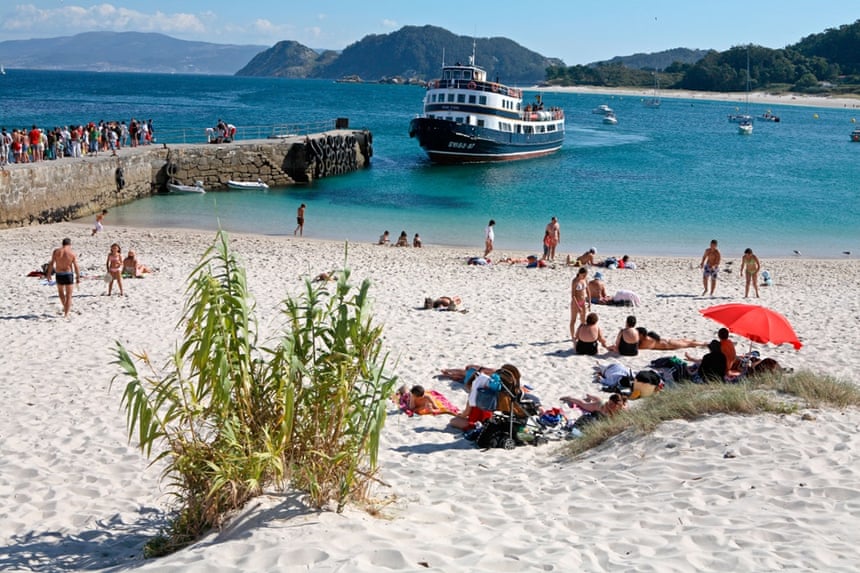
Despite this paper naming Rodas beach on Las Islas Cíes one of the best beaches in the world, these islands remain an off-the-beaten-track gem, thanks to a strict limit of 2,200 tourists a day. Their nickname – the Maldives or Seychelles of Spain – gives a clear indication of what to expect: gorgeous white beaches, turquoise waters … in other words, your average untouched paradise. The three islands (Monteagudo, San Martiño and Faro) opposite the town of Vigo on the Galician coast form part of the Islas Atlánticas national park. This means its wildlife, including colonies of marine birds and rich marine life – which can be explored by scuba divers (with a permit) – is protected.
Stay The only accommodation is a campsite – Camping de las Islas Cíes – with 800 places on Faro, which opens in Easter week, and on subsequent weekends until June, and then regularly between June and September. From £5 adults, £4 kids; £50 to hire a double tent.
Getting there A ferry service from the harbours of Vigo, Cangas and Baiona starts in Easter week and runs weekends and then everyday between the beginning of June and the end of September.
Stay The only accommodation is a campsite – Camping de las Islas Cíes – with 800 places on Faro, which opens in Easter week, and on subsequent weekends until June, and then regularly between June and September. From £5 adults, £4 kids; £50 to hire a double tent.
Getting there A ferry service from the harbours of Vigo, Cangas and Baiona starts in Easter week and runs weekends and then everyday between the beginning of June and the end of September.
Hiiumaa, Estonia
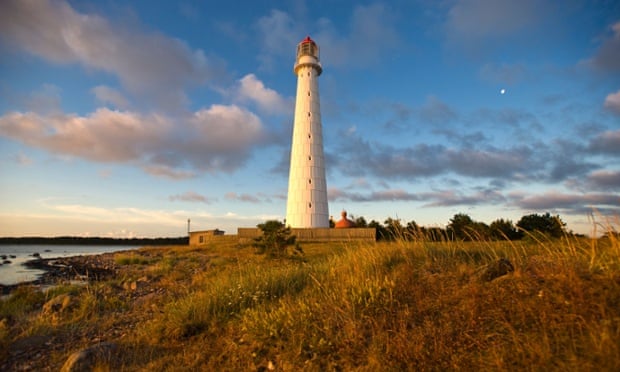
The smell of nature hangs heavy on Hiiumaa: from white sand beaches slightly damp after a rainfall, and seaweed sweetly fermenting at one end of the beach. The second largest island in Estonia, this is the place to come if you have a book to write or pictures to paint. There’s not much to do other than tramp along the coastal paths and admire centuries-old Baltic-style lighthouses. For history buffs, there’s an old Soviet bunker to explore, but mostly people come here to feel the sand between their toes and clear their heads. Thanks to the island’s microclimate, Hiiumaa is a lot warmer than Estonia’s mainland, which makes exploring the town of Kardia’s wooden houses and relaxing in Roograhu harbour’s floating sauna even more appealing.
Stay Kassari Puhkekeskus, doubles from £50, has bicycles to rent and a large sauna.
Getting there It’s a 35-minute flight from Tallinn or half-hour ferry ride from Rohuküla, details for both at hiiumaa.ee
Stay Kassari Puhkekeskus, doubles from £50, has bicycles to rent and a large sauna.
Getting there It’s a 35-minute flight from Tallinn or half-hour ferry ride from Rohuküla, details for both at hiiumaa.ee
Samothrace, Greece
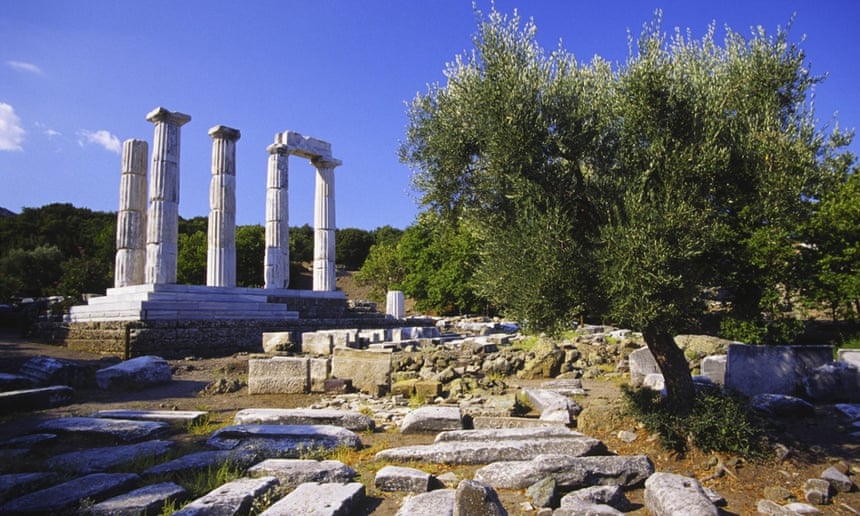
The drums beat late into the night and oil torches flare at one of Samothrace’s many beach parties. Eyes closed, the smell of bonfires and tannic red wine transport you back to when life was dictated by the Temple of the Winged Nike, now a crumbling ruin. Its many repeat visitors love the unaffected nature of this north Aegean island. As well as a solid collection of hiking paths, a bucolic waterfall trail, and sweeping deserted beaches, the island’s hot springs and hillside thermal pools only add to the sense of otherworldliness.
Stay The Archondissa Boutique Beach Aparthotel is secluded and just 20 metres from the beach. Each room has a sizeable balcony and terrace, studios from £40.
Getting there A Saos ferry from Alexandroupoli (on the mainland) takes three hours. Thessaloniki is six hours including drive and ferry.
Stay The Archondissa Boutique Beach Aparthotel is secluded and just 20 metres from the beach. Each room has a sizeable balcony and terrace, studios from £40.
Getting there A Saos ferry from Alexandroupoli (on the mainland) takes three hours. Thessaloniki is six hours including drive and ferry.
Margaret Island, Budapest, Hungary
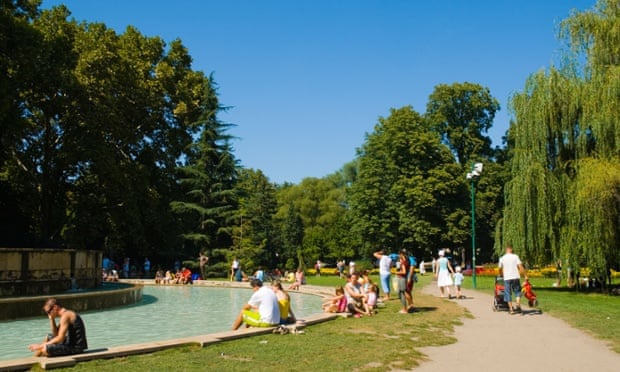
Margaret Island, in the middle of the Danube in central Budapest, spends winter shrouded in mist; come summer the island is an oasis in the midst the city. Encircled by a 5km asphalt running track and jetties from which to launch small boats (and bodies – some of the swimmers here are hardy folk), the illusion of an island holiday is enhanced by two thermal spa complexes. Both cost less than £10 for the day, and, after you’ve soaked, take a romantic walk around the island to visit the ruins of the 13th-century nunnery. At sunset grab an ice-cream and sit down to watch the fountains dance in time to the music.
Stay The Danubias Grand Hotel Margritsziget has doubles from £68.
Getting there The island is a five-minute walk across the bridge from Budapest’s district IV.
Stay The Danubias Grand Hotel Margritsziget has doubles from £68.
Getting there The island is a five-minute walk across the bridge from Budapest’s district IV.
Contributed by Eleanor Ross, www.theguardian.com
No comments:
Post a Comment